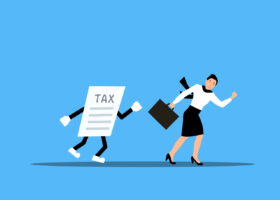6-Minute Read
Even if you personally don’t know anyone affected by COVID-19, your life has probably been impacted if not outright disrupted. We’re all adjusting to this new reality. Among other things, social distancing should hopefully protect us physically and help flatten the curve. But the longer this situation persists, the isolation effects could become another battle we face. With constant news coverage and observing the reactions around us in our communities, it’s hard not to feel some level of anxiety.
Then we have the economic impact, volatile markets and perhaps questioning our own investment strategies. You may hear things like “stay the course” and “don’t panic”. Broadly speaking, these are wise statements often part of the broader advice you’ll hear from a financial planner. But is that satisfactory or even actionable? This piece attempts to put some perspective around this issue by looking at three questions often asked during stressful times like these.
One – Is this time different?
It is only natural to pose this question when entering or immersed within a market downturn. The answer, while perhaps not entirely satisfying, could be both Yes and No.
Why This Time Could Be Different
This comes from the observation that the cause (or at least catalyst) of each market downturn is unique. We don’t have to look too far back for supporting examples. We had the subprime mortgage crisis of 2008, the terrorist attacks of 2001, and the tech bubble of the late 1990s. Each episode was indeed very different in what sparked the subsequent recession.
Did you even know what a credit default swap was before 2008? Don’t worry; most people didn’t know then and still don’t know. This time really is different in the sense that the “cause” is an airborne virus and our responses to controlling this situation must also be fundamentally different.
Why This Time May Not Be So Different
Then how can we also take the view that this time is not different? The answer comes from the idea that markets (and civilization) find a way to survive and grow stronger over time. Nick Murray, author of several books for financial advisors, is often noted for saying: “Optimism is the Only Realism”. Bold statements like this come from taking a long view of progress. The growing pace of technological and scientific discoveries raise global standards of living and the results ultimately get reflected in long-term returns of global equities.
For an excellent perspective on the prospects for a better future, check out Laurence Siegel’s book Fewer, Richer, Greener. As just one example, Siegel makes some convincing points about the benefits of the formation of bigger cities. These are not just economic benefits, but surprisingly environmental too. Yet when a contagious virus is involved like COVID-19, cities must bear the bigger problem of containment due to higher population densities. This is only one of the many tradeoffs humans make for the sake of progress and prosperity.
Crises Do End (Eventually)
The key point here is if we use history as a guide, this current crisis will also come to an end. It’s ok to have doubts. But if you can believe that brighter days are ahead, then this time really won’t be different.
Two – Are the markets functioning?
Yes, the markets are functioning and designed to handle volatility. The following statement may be an oversimplification but remember there is a buyer for every seller.
Circuit Breakers
You may have heard that these so-called circuit breakers have been triggered on certain trading days recently. What happens is that trading is paused for a period after a specified percentage of decline. This gives investors a chance to re-assess the situation and can provide stability to our markets.
Benefits of Flexible Trading
A related aside: One of the reasons Krishna Wealth Planning uses Dimensional Fund Advisors as a primary component of client portfolios is because they use a flexible trading approach that can function efficiently in all types of market environments. Different events can occur during any day that create increased trading volumes and higher “bid-offer” spreads. What this ultimately means is if your trading approach requires immediacy, it can be very inefficient and create large trading costs over time.
A Reminder that Volatility is Normal
As investors we should also remember that capital markets find a way to re-price themselves from time to time to attract new investors. If not a dangerous virus, it could be something else that creates a market correction. Volatility is a normal part of investing. For additional perspective on that, see last month’s related blog post: The Coronavirus and Recent Market Volatility.
Three – Is it a Good Time to Invest Now?
Prices quickly incorporate new information and expectations about a company’s future risks and opportunities. But it doesn’t mean that markets are always trading on fundamentals or logic. Having liquidity (access to cash) has been the recent demand for both individuals and institutions.
Government Actions
Governments and the Federal Reserve are using every tool at their disposal to create liquidity. The long-term impact to wealth and prosperity shouldn’t be ignored when these types of interventions are in play. Brian Wesbury recently wrote a piercing commentary on this called Cut the Politicians’ Pay.
On the other hand, governments and individuals are figuring out on the fly how to deal with this situation under intense time pressures. Expecting optimal decision making may not be realistic. The hope for now is that the decisions being made buy enough time for health care providers to treat people affected and somehow keep businesses (both small and large) afloat in the process.
The Challenges of Market Timing
In some ways, the capital markets now are metaphorically “starving” for capital. Those who can be suppliers of that capital should expect a higher return. That said, there is no reliable way to identify a market peak or bottom. Markets are a complex, adaptive system. My friend and colleague, John Bernstein, recently wrote a compelling short piece on the futility of Market Timing.
What We Can Do (or Not Do)
So, we can never truly know in objective terms if now is the right time unless you have the clairvoyance to identify a market bottom. But we can look back at US Equity Returns Following Past Downturns for some insight into positioning ourselves to capture a recovery.
One solution comes back to “staying the course” with your strategy. Yes, that may be easier said than done. But it can also mean different things to different people. For example, if you were already investing money regularly, and you have the capacity to continue doing so, consider the benefits (even if largely psychological) of dollar-cost-averaging. Gradually put money to work in the markets while freeing yourself from the worry that now is the right time.
Risk is an Arbitrary Concept
Sound financial decisions eventually circle back to your personal goals, productivity needs and risk tolerance. Regarding the latter, it may be fair to say now that risk is an arbitrary concept until you experience it. Deciding now that you don’t have as much risk tolerance as you thought, coupled with acting on that decision, has other potential ramifications to consider. What we do (or don’t do) now impacts the investment income we can generate in the years and perhaps decades ahead.
Appreciate Those on the Front Lines
When emergencies happen, society responds, human ingenuity gets put to the full test and heroes emerge. If we haven’t already done so, let’s express our appreciation for those on the front lines treating those affected by COVID-19 and risking their own health in the process. Let’s also take every sensible measure we can to keep ourselves and our loved ones healthy. We will get through this together.
If you have comments or questions on this piece, please drop me a line at: [email protected]
References
- https://www.livescience.com/coronavirus-flatten-the-curve.html
- https://www.investopedia.com/terms/c/creditdefaultswap.asp
- https://www.amazon.com/Fewer-Richer-Greener-Prospects-Abundance/dp/1119526892
- https://www.npr.org/2020/03/09/813682567/how-stock-market-circuit-breakers-work
- https://us.dimensional.com/
- https://krishnawealth.com/the-coronavirus-and-recent-market-volatility/
- https://www.ftportfolios.com/Commentary/EconomicResearch/2020/3/23/cut-the-politicians-pay
- https://bernsteinfinance.com/blog/f/market-timing-in-the-stock-market-is-a-great-way-to-lose-money
- https://nyl.as/t1/183/9ga98fl8zsd9exp22qtarzmqu/0/35065450107d520171d28f7ae386387b942b16d5f267d20bd4b73001af38b6f9
The information on this site is provided “AS IS” and without warranties of any kind either express or implied. To the fullest extent permissible pursuant to applicable laws, Krishna Wealth Planning LLC (referred to as “KWP”) disclaims all warranties, express or implied, including, but not limited to, implied warranties of merchantability, non-infringement, and suitability for a particular purpose.
KWP does not warrant that the information will be free from error. None of the information provided on this website is intended as investment, tax, accounting or legal advice, as an offer or solicitation of an offer to buy or sell, or as an endorsement of any company, security, fund, or other securities or non-securities offering. The information should not be relied upon for purposes of transacting securities or other investments. Your use of the information is at your sole risk. Under no circumstances shall KWP be liable for any direct, indirect, special or consequential damages that result from the use of, or the inability to use, the materials in this site, even if KWP or a KWP authorized representative has been advised of the possibility of such damages.
In no event shall KWP have any liability to you for damages, losses, and causes of action for accessing this site. Information on this website should not be considered a solicitation to buy, an offer to sell, or a recommendation of any security in any jurisdiction where such offer, solicitation, or recommendation would be unlawful or unauthorized.





